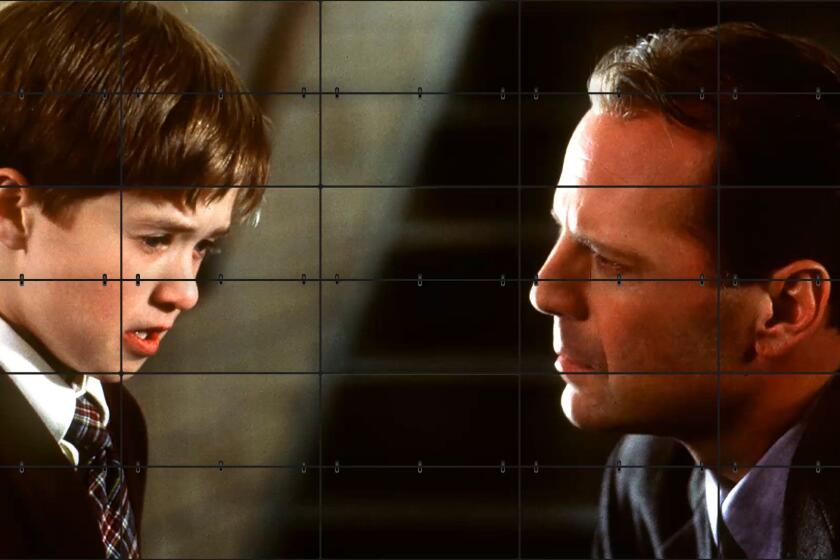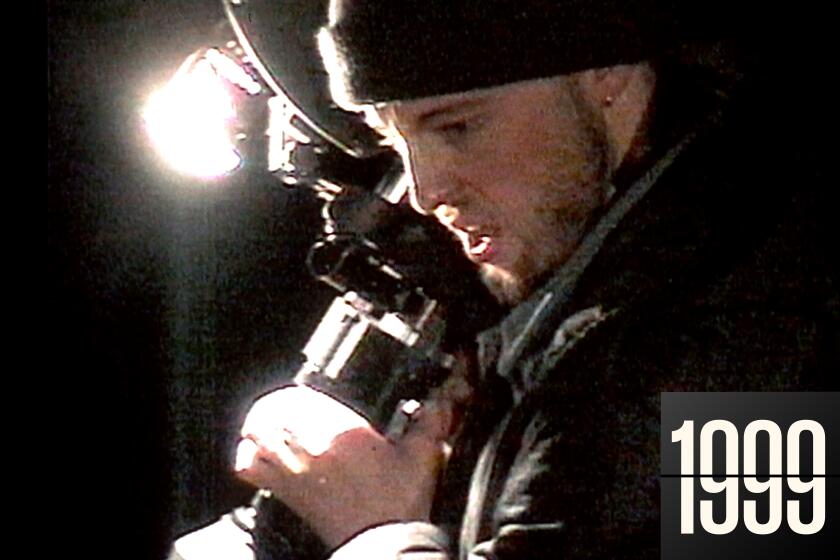Stark Reality Slows Down ‘Streets’ : Documentary About South-Central Proves a Hard Sell in Hollywood
“It’s reality.”
That’s the common line used to defend portrayals of violence, misogyny and other harsh situations in such inner-city dramas as “Menace II Society” and “Boyz N the Hood” that are steeped in gangsta rap culture.
For the record:
12:00 a.m. Aug. 26, 1994 For the Record
Los Angeles Times Friday August 26, 1994 Home Edition Calendar Part F Page 27 Column 3 Entertainment Desk 2 inches; 37 words Type of Material: Correction
Prison tour-- In a Wednesday Calendar story concerning a documentary film about South-Central Los Angeles and gangsta rap culture, a lawmaker who in the film is shown touring a prison facility was misidentified. It was actually County Supervisor Yvonne Burke.
Now two Los Angeles filmmakers are trying to make a movie that shows the reality of gangsta rap’s societal roots. Like those other films, the project being produced by Keith O’Derek and Rob Corsini is set on the mean streets of Compton and features appearances by major rap stars, including Snoop Doggy Dogg, Ice Cube and Ice-T.
“We’ve got more players in this film than ‘Poetic Justice,’ ” says O’Derek, 33, referring to the movie that starred Janet Jackson and rapper-actor Tupac Shakur.
But unlike the others, O’Derek and Corsini’s film, “Straight From the Streets,” is a documentary--and faces an especially daunting challenge because the genre is such a tough sell in Hollywood.
*
The film, mostly shot but still unedited, examines the forces at work in South-Central L.A., showing hopelessness and cynicism as the pervasive mood among young African Americans who seem to expect early, violent deaths and no breaks from the system.
With the rappers serving as on-screen narrators, O’Derek and Corsini show everything from gangbangers talking about trying to get something from the system any way they can, to Rep. Maxine Waters (D-Los Angeles) touring an imposing prison facility being built next to South-Central, to a funeral for a former gang member who had turned into a crusader for peace. And through it all, rap is the common thread--a ubiquitous cultural force and, for many, the only possible escape.
“We know there’s a lot of violence out there, and the way the media portrays it seems so overwhelming,” says Corsini, also 33, now a news cameraman and producer at KNBC-TV. “But ultimately the strongest message that has to come out of this--and we’ve focused on it since the beginning--is there is a way out. There are ways to express yourself artistically that can get you out of the cycle of self-destruction.”
Jorge Hinojosa, Ice-T’s manager, says it’s crucial that this reality--the positives and negatives of the inner city--be seen by the general public.
“There’s so much misinformation and ignorance about South-Central,” he says. “Just because people don’t live there doesn’t mean it’s not their problem. South-Central is growing and eventually it’ll be on everyone’s doorstep, whether they like it or not. This documentary is real important and people have to have their eyes opened to it.”
“Straight From the Streets” started during the 1992 L.A. riots when O’Derek, who had chronicled the hip-hop world since 1984 on his own Paragon Cable community access show, “Upfront Videos,” took footage he’d shot in Compton to NBC’s “Eyewitness Video” producers. But instead of the riot shots that show was looking for, O’Derek had sequences of people talking about the crisis.
Ultimately that footage did end up on various news shows--including the famous clip of Ice-T saying he wanted to burn the White House down, which was seen frequently during the controversy over the rapper’s song “Cop Killer.”
Corsini, then a cameraman for “Eyewitness Videos,” was impressed by O’Derek’s work and his refusal to portray inner-city life as a dead end. The two started work on “Straight From the Streets.” The reality O’Derek and Corsini have encountered, though, is that it’s harder to get the true story told than fictionalized versions.
Even with appearances by the biggest rap stars in the business, and pledges of songs for the soundtrack and a potential accompanying album (on BMG Music Publishing’s “street” label, PGA), O’Derek and Corsini have been unable to get a studio to finance the film’s completion.
The filming was done on a shoestring budget with the two of them handling most of the work, from camera to sound to the preliminary editing. The filmmakers say they need $400,000 to complete the film.
A short “sampler” reel the two edited with their own money has piqued interest among mid-level film executives and led KTTV-TV’s “Good Day L.A.” morning program to sign O’Derek to produce weekly “Straight From the Streets” reports.
Still, no one approached by O’Derek and Corsini has yet come forward with the money to complete the film.
What’s the hitch?
“ ‘Documentaries don’t sell’ is one thing I’ve been told a lot,” O’Derek says. “And, ‘Rap attracts violence.’ ”
The general feeling is that it’s more the former argument than the latter that has been the roadblock, perception being that there’s no market for big-screen documentaries. Only four--”Roger & Me,” “Paris Is Burning,” “The Thin Blue Line” and Madonna’s “Truth or Dare”--are cited as theatrical hits of recent years.
It’s also been suggested that “Straight From the Streets” might be better suited for TV and home video release. But O’Derek remains committed to the big screen.
“There’s really no way to tell how this would do,” he says, “because it’s never been tried before. And the reception from the people in the (South-Central) community who have seen what we’ve done is overwhelming.”
More to Read
Only good movies
Get the Indie Focus newsletter, Mark Olsen's weekly guide to the world of cinema.
You may occasionally receive promotional content from the Los Angeles Times.










